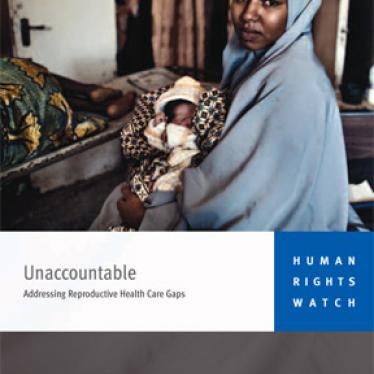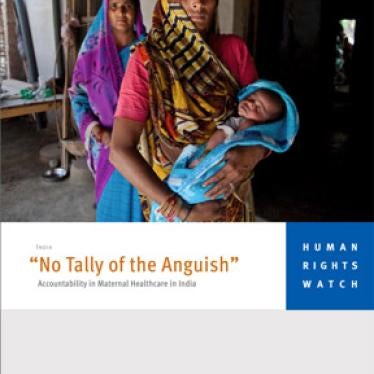(New York) - Maternal and reproductive health care across the world is often sub-standard and inaccessible, yet many governments are not doing enough to address grievances and track problems, Human Rights Watch said today. Human Rights Watch issued a roundup of its reporting on reproductive health issues in advance of the International Day of Action for Women's Health, on May 28, 2010.
The 10-page roundup, "Unaccountable: Addressing Reproductive Health Care Gaps," illustrates health system accountability failures in Asia, Latin America, Africa, the United States, and Europe. Accountability is a major theme for global efforts to improve maternal health, including those connected to the United Nations-backed Millennium Development Goals and the 2010 G-8 summit meeting.
"Governments have long pledged to reduce maternal deaths and improve reproductive health care," said Janet Walsh, deputy women's rights director at Human Rights Watch. "Yet many aren't taking even basic steps, like enabling patients to lodge grievances, addressing complaints, establishing health standards, and tracking births and deaths."
In interviews around the world, hundreds of women and girls have described the pursuit of reproductive health care as an obstacle course. Logistical, cultural, and financial barriers to services and information, discrimination, and abusive health providers block the way.
Many governments have done far too little to establish functioning grievance mechanisms, Human Rights Watch said. They have neglected to inform patients of their rights and what to do when they are violated. Many women fear retaliation if they complain:
- Women in India told Human Rights Watch that they had never heard of a way to make complaints about maternal health care problems. A few said they had submitted complaints, but were pressured by health professionals to withdraw them.
- In US immigration detention facilities, many women said they were never informed that they could submit grievances about health care problems, and some feared retaliation if they complained.
Many governments lack sufficient standards and guidelines for reproductive health services. In Mexico, for example, most of the federal states have no administrative guidelines on access to legal abortions after rape. As a result, many officials are afraid to facilitate access and deny that they have any mandate to do so.
"Missing or unclear standards hamper efforts to monitor quality of care, and to ensure that health care is available to all who need it," Walsh said. "Accountability is impossible without clear standards."
Tracking health budgets, ensuring independent oversight, and releasing information on health spending to the public are also important elements of accountability, Human Rights Watch said. In many countries, budget allocations for reproductive health are unclear, making it more likely that funds will be misused. Often, the public has little ability to find out where their country's resources are going. In some cases, this lack of openness feeds corruption.
For example, in several Nigerian states Human Rights Watch documented instances in which health funds were squandered or outright stolen. One local government official allocated money to a "fish pond" with neither water nor fish and a "football academy" that he never built, while health clinics crumbled.
Collecting and analyzing data, including registering births and deaths, is another essential element of accountable health systems, Human Rights Watch said, but many governments are neglecting data collection.
For example, the Irish government does not collect data on the number of legal abortions carried out within Ireland, nor does it estimate the numbers of illegal abortions. In India, even though birth and death registration are mandatory, many births and deaths are not recorded. An estimated 26 million births and 9 million deaths occur in India every year, but only 53 percent of births and 48 percent of deaths are registered. Estimates of maternal deaths each year in India range from 60,000 to nearly 120,000, but without better birth and death registration and improved data collection systems, the actual numbers are impossible to know.
"Ignoring grievances and failing to set standards or monitor progress undermines governments' lofty goals for saving lives and promoting reproductive health," Walsh said. "Governments, with support from international donors and agencies, need to do far more to achieve health system accountability."
Human Rights Watch called on governments to:
- Establish accessible grievance mechanisms to facilitate inquiries into maternal deaths and other health system complaints.
- Monitor the provision of reproductive and maternal health care, improve data collection and civil registration systems, and release health data to the public.
- Develop guidelines on reproductive health services and ensure that they are understood and implemented by healthcare providers.
- Ensure that health budgets are sufficiently detailed to allow tracking of reproductive health spending, and make budget information available to the public.








